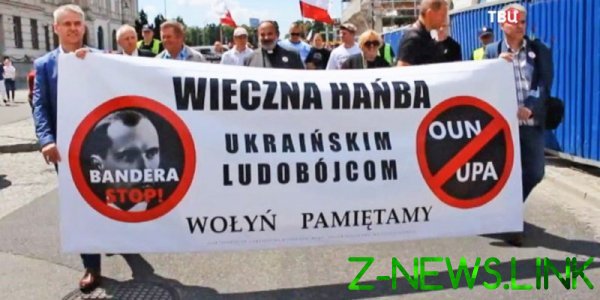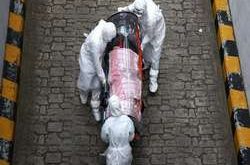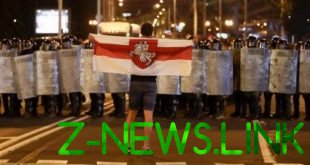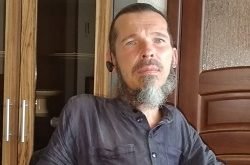
Relations between Ukrainians and poles has never been simple: from love to hate there’s always been a half step. One of the most controversial moments of shared history — the Volyn massacre: the genocide of poles arranged in the Second world war, Ukrainian partisans. To this day, this episode is remembered every time when it comes to the history of neighbouring peoples.
“He hoped that the relatives of the Ukrainians will protect him. But when they came to kill him, the family did not even know (…). He was on the street, it just came up and chopped the head with an ax. I went to the house in bed sleeping wife. When she was hit with an axe on the head, then the boy — he was nine or ten years- jumped up and yelled, “Stephen, don’t kill me! I’ll give you bread!” Apparently, he was familiar with the killer knew his name. And he swung his axe and the boy collapsed on the floor”, the terrible memories of eyewitnesses, survivors of the Volyn massacre, do not give to forget about the crimes neither Warsaw nor Kiev.
From 1921 to 1939 Volhynia with the prevailing Ukrainian population was part of Poland. Thus, the authorities openly followed a policy of assimilation of Ukrainians massively closed Orthodox churches and monasteries, gave Volhynia Polish war veterans. The Ukrainians did not take a prestigious job — they are almost officially were people of “second class”.
During the Second world Volyn peasants more than repaid his tormentors: at this time, the Nazis controlled only Volyn city and in the surrounding woods acted polubanditskoe wrestler: “Bandera” Ukrainian insurgent army (UPA), fighters of the Polish home Army (subordinated to the Polish government in exile) and the red partisans. The Ukrainian partisans were not United — Bandera UPA, for example, did not recognize a field commander Taras Borovets, known under the pseudonym Taras Bulba, established his own organization “woodland Sich”.
And the same Taras Bulba collaborated with the Germans, but refused to participate in punitive operations against the Jews. Local poles and soldiers of the home Army was more sympathetic to the USSR, and the Ukrainian nationalists and the Germans. For example, the local police, the Nazis recruited mainly Ukrainians, but not poles.
Since 1943 the UPA began the mass destruction of Polish villages. Taras Bulba, by the way, this action was condemned. Decided to bet on deterrence: that is required to kill women and children to force all poles to leave Volhynia, — thus began the “Volyn massacre”. In response, the soldiers of the home Army conducted retaliatory action against the Ukrainians.
According to the latest data, in the Volyn massacre killed about 50 thousand people, mostly poles. The Polish Sejm establishes the Volyn massacre as a “genocide committed by Ukrainian nationalists against the citizens of the Second Polish Republic in the years 1939-1945”. The leaders of the Ukrainian nationalists Stepan Bandera and Roman Shukhevych recognized in Poland state criminals.
In the times of Kievan Rus, the Vladimir-Volyn was the capital of Galicia-Volyn Principality — one of the most powerful States of the Eastern Slavs of that time. Its antiquity this city can compete with Kiev, Vladimir and Novgorod.
The city today still has the magnificent assumption Cathedral of the XII century and several masterpieces of Orthodox architecture in later centuries. By the way, “Volyn”, the city became known only after joining the Russian Empire, to avoid confusion with the famous “namesake”.
However, now of its former glory remained in the city not so much. Today, 40-thousand Volodymyr-Volyns’kyi — the personification of the Western Ukrainian province. Compared to neighboring Lviv region and Transcarpathia, there are virtually no foreign tourists, and the town looks very provincial.
The local architecture is a bizarre eclectic mix of ancient Orthodox churches, Polish churches, Soviet Khrushchev and the prevailing private buildings.
The locals, though very friendly, easy to involuntary rudeness in this remind donbastsev, despite the fact that speak exclusively in Ukrainian. During the Second world war in the vicinity of this ancient city, the UPA carried out the most large-scale ethnic cleansing of the poles. Alas, in the city center is a monument to soldiers of UPA, but not their victims.
In order to understand the “Polish point of view”, I decided to visit the local Catholic Cathedral. The service here leads the Polish citizen — overgrown beard monk Leshik. “Pure poles in Volyn already almost there, but the blood remained. They come to us. Usually the service is going to about 70 people, and on major holidays, Christmas or Easter, to a few hundred” — it tells me the priest.
Pan Leshik flatly refuses to discuss with me the topic of the Volyn massacre: “You understand, it is too delicate. I as a priest and also to the foreigner it is better not to touch. Here, it is better to take the gift of a chocolate egg, I from Poland brought.”
By the way, later it turned out that the caution shown not only by Mr. Leshik, but other poles living in Volhynia. So, Marek Sabur, Vice-Consul of Poland in Lutsk, agreed to speak to me only off the record: “You see, here too big change of personnel. I don’t want to lose a place because of one wrong word.” I told him that I understand: I remember that recently there was a scandal with some Polish Vice-Consul, who said that Lviv was a Polish city.
“It was just me. I was provoked. I actually just said that before the Second world war we lived in Lviv, mostly poles. But this is the accepted truth, and it presented what I consider Lviv Polish city,” admitted Sapor.
Even more surprised me, the main Chairman of the society of poles in Volyn region Valentin Vakulyuk. In his opinion, the main problem is not the Ukrainians and the poles, and in Russia, which has long been trying to conquer Poland and Ukraine. Thus, in contrast to the Polish Sejm, Mr. Vakulyk flatly refused to accept responsible for the genocide of the UPA, as it is not “historian”. How behaved the “main pole of Volyn”, is very reminiscent of my conversation with one of the Lvov Rabbi, who claimed that the Jews and Bandera lived in perfect harmony.
When I told my local friends about the unusual views of the chief of the Volyn poles, they were not surprised at all. “If Vakulyk denounced the UPA… the prison would not planted, but to throw a stone at a window to scare the kids might,” he told them. However, one of the parishioners of the Church of the city of Vladimir-Volyn, 60-year-old programmer the novel to criticize the UPA was not afraid. It turned out that the novel pole only a quarter: his grandfather was married to a Polish woman. During the war my grandfather regularly tossed the note: “Kill my wife”. Strained relations with the local grandmother of the Novel was preserved in the Soviet era.
“Although my grandmother lived in the village, she always emphasized was dressed like a city. In the restructuring, when the products have been very bad, my grandma, dressed, came to the General store, where there were long bread lines. “Oh, our Polish lady here!” — began to sneer from the queue. “I am Pani, and you have been farmers, so they stayed!” retorted Granny,” shared Roman family history.
However, he with the national problem has never faced: “It was typical for people of the war generation. The less they remain alive, the less mutual distrust between poles and Ukrainians.” He gave an example: during the war near the town the Germans built a concentration camp for Soviet prisoners of war. Twenty years ago there were regularly visited by relatives of the victims at the mass grave of a concentration camp was always flowers, and now this place is almost abandoned. The same thing happens with the Volyn tragedy, a growing number of its witnesses are no longer alive, and young people this issue is uninteresting.
At the same time, according to the novel, now Volyn massacre once again trying to use in Poland and Ukraine, but how artificially inflated a political problem. By the way, even if you lose interest in her completely forget about the massacre is simply unrealistic. So, in 1944, all of the Volhynian poles were deported to Poland and settled in homes of Ukrainians from Poland — since there live their descendants.
“Polish theme will long remind yourself. For example, my parents live in the former Polish village. From the poles there remained a lot: wells, Apple orchards. Often, digging in the garden, we find some items left by former owners. But I don’t think that what happened to blame the Ukrainians. My grandmother told me that at first they lived with the poles very friendly, but then Moscow decided to embroil us artificially, using his favourite technique of “divide and conquer”,” he tells me 40-year-old saleswoman from Vladimir-Volynskiy.
Near Vladimir-Volyn was the Polish village of Islands, burned to the ground by the soldiers of the UPA during the war. Now, the village remained only the field, and the burial of the dead poles and a monument in honor of the victims of UPA is located in the former village cemetery.
When I arrived there, we were surprised to find next to him, living in tents of poles. The eldest of them was the head of Department of search of graves of the Polish Institute of national remembrance in Lublin, Leon Popek. He met me very warmly — congratulated Orthodox Easter and had a small tour through the cemetery, showing the grave of his grandfather.
It is interesting that at the cemetery there is a grave of Polish soldiers and red army soldiers, killed in battles with each other in the 20-ies of the last century. “Dead are all equal, so Polish soldiers, and soldiers we buried together, putting on the cross and those and others”, — the scientist told me.
In General, my communication with the Polish activist were very good, but exactly to the moment I started taking pictures of the tent poles. My new friends were very unhappy with, and Leon had Popek even remembered Russian and said that I have a “disservice”. And not too willingly explained to me the poles, work in the cemetery they are “not quite official.”
The fact that the exhumation of the poles and the care of their monuments oversees the Ukrainian Institute of national memory. This institution has assumed, in fact, functions of the Ministry of culture, was created at the initiative of the former Ukrainian President Viktor Yushchenko “for the reconstruction of fair history of the Ukrainian nation” and “the formation and implementation of state policy in this direction.”
In 2016 the Ukrainian Institute of national memory prohibited the exhumation of the graves of poles, as well as care for their graves. From the point of view of Kiev, this “solution” for the dismantling of the monument to the UPA in the Polish village of Krusevice. First, the place is just destroyed, local authorities, and a year local archaeologists exhumed and came to the conclusion that the tomb buried not Bandera. Interestingly, the poles are not against the gravestones on the graves of Bandera, but do not agree on the memorials to the UPA. In Poland it would look as wildly as monuments to the Nazis in the USSR.
I must say that the bias in the Ukrainian Institute of national memory is shown very clearly — he asked only “ideologically dead”. According to the Chairman of the society of poles of Ukraine Vladislav Zvarych, he told a local scientist about the old graves of the Soviet soldiers of the First Ukrainian front in Hungary — among them the majority were Ukrainians. “I replied: “Yes, that’s the Ukrainians, but it is pure Ukrainians, that is wrong”,” he laments.
Another example: Ukrainian soldier Vadim dorofeenko was searching for the remains of Soviet soldiers and their graves put the “stars”. There was a scandal: dorofeenko was accused of violating the law on decommunization. However, the “culprit” failed to prove that the law on de-communization does not apply to the burial, but the passport on the “ideologically incorrect” dumping him is not allowed. This means that the grave is not included in the official registers, and their impunity can destroy anyone.
For the sake of completeness it should be noted that Ukraine remains primarily monuments to the fallen of the Second world war, but their “deideologized”. For example, the monuments to Soviet soldiers are considered “seditious” and they removed the fuss about the illegal demolition of the monument to Georgy Zhukov in Kharkov. However, there are exceptions: for example, in one of the Carpathian villages before the Soviet monument to the soldiers of the red army put a large cross and thereby saved it from destruction.
From Vladimir-Volynskiy, I went to the neighboring Polish town of Chelm (Kholm). The city was founded in the XIII century by Prince Daniel of Galicia as the residence of the ruler of Galicia-Volyn Principality. After the death of Daniel in 1264 Kholmshchyna was divided between his sons, then grandchildren. The hill is mentioned in the chronicle “List of Russian cities far and near”. It was the center bordering the historic Volyn, Kholm region, where until 1944 was home to a large number of Ukrainians.
“From 1944 to 1946 of the Holm force to Ukraine has been sent to 530 thousand Ukrainians. Another 150 thousand in the postwar years were deported during “operation Vistula,” West Poland” — it tells me the immigrant from Poland, honorary Chairman of the society “Kholmshchyna” Volyn region Mykola Onofriychuk.
Incidentally, he does not consider the Volyn events as genocide of poles. “It’s just nonsense. Killed on both sides. We in Chelm the poles destroyed the 213 villages. Polish bandits raided our village, pointed a gun at the forehead and forced to be baptized. If a person was baptized as an Orthodox, he was killed”, — he told.
Now the helm looks like a typical small Polish provincial town, but reminders of the former presence of Ukrainians are still there. For example, I stayed at the hotel Kozak. It turned out that it’s just the name of the owner of the hotel, which has a very distant Ukrainian roots. However, completely about the links with their historical homeland, the owner of the hotel does not forget: in the dining room hang portraits of Ukrainian Cossacks. Is at the helm and a rather impressive Orthodox Church. Her priest father John hails from the Polish town Bialystok, in the vicinity of which many Belarusian villages.
I confessed to father John, his family spoke a strange mixture of Belarusian, Polish and Ukrainian words. According to the priest, now at the helm were only 120 of Ukrainian families, but many immigrants from Ukraine. “On the Volyn tragedy of the poles, of course, remember. For example, the station is a monument to the victims of the Volyn massacre and in commemoration of the tragedy he collected a few hundred people,” says me father John.
At the same time, he is confident that in spite of the Volyn events, the Ukrainians in Poland are quite friendly: “the vast majority of poles do not blame in the tragedy for all Ukrainians. I often visit the dormitories, where they live, immigrants from Ukraine. Guys live with the poles very friendly. Nationality does not bother anyone here”.
In General, it seemed to me that the opinion of the priest is true, although with some minor reservations. Ukrainian students Chelm culinary College admitted on the changes they were forbidden to speak Ukrainian, supposedly for them to improve your Polish.
From the “guest workers” I have heard that poles don’t like it when people turn to them in Ukrainian: it is better to speak in broken Polish or English. But in General, in my opinion, in Poland, migrants are considered “in the West”: that is much more tolerant than in Russia.
Regarding the Volyn tragedy for most people in the helm is no longer relevant. Almost no one in town could explain me where is a monument to the victims of the massacre. Moreover, an employee of local history Museum, assured me that such a monument just yet — nevertheless, it exists and even contains in perfect condition.
At the time, the leader of the Iranian revolution Ayatollah Khomeini singled out the three “devils”: “the Great Satan” — the United States, “secondary devil” — the USSR and the “small Satan” — Israel. With some difficulty you can make a joke that “a Big Shaitan” for Poland is Russia, and “small” — Ukraine.
About old wars like Ukraine, and with Russia in Poland remember. For example, there is popular anecdote: “the Pole asked, what he thinks about the middle East issue. He thought a moment and replied, “Well, we Kiev has clearly lost, but for the lions and you can still fight””.
Today, however, the majority of poles perceive Russia as a much greater threat than Ukraine. Therefore, from the very beginning of the Maidan in Poland by far put on the “revolution of dignity” — it was supported, perhaps, all the TV channels of the country. Today Poland and the Baltic countries — the most loyal allies of Ukraine in the fight against “Russian aggression”. But gradually sympathy for the “free and democratic Ukraine,” fighting against the “terrible Russia” starts to falter.
So, in Hungary and Romania provoked an extremely negative reaction to the laws on education and language that is directly infringing upon the rights of Ukrainian Hungarians and Romanians. The poles in the Ukraine is almost gone, so that the Ukrainian laws in Poland took relatively indifferent, but in this country, causing strong dissatisfaction with the glorification in Ukraine of Ukrainian nationalist organizations, the innocent, according to the official wording of Warsaw, the genocide of the inhabitants of Poland.
In this situation many people start to think, whether always right, the expression “the enemy of my enemy is my friend”? It is not excluded that soon the justice of this phrase in the European capitals will begin to doubt.
The activities of the Ukrainian insurgent army (UPA) banned in Russia.
© 2019, paradox. All rights reserved.





